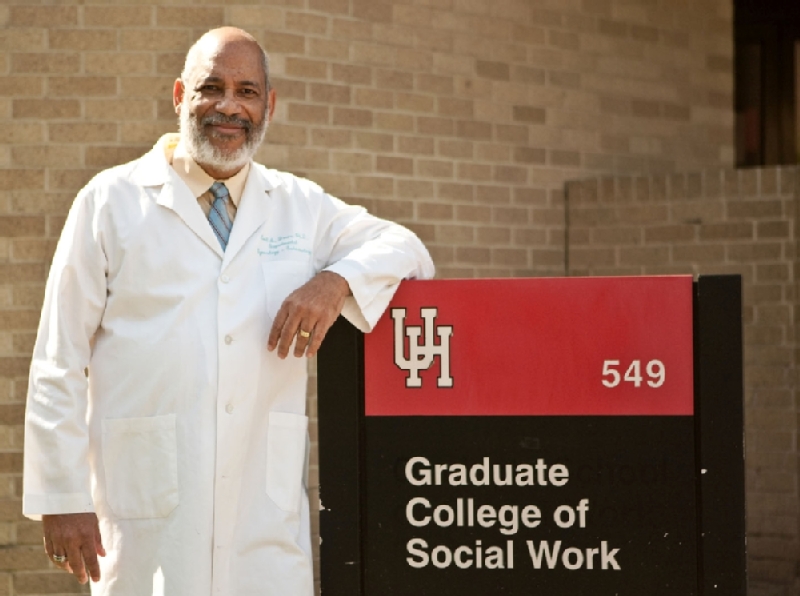The University of Houston (UH) will soon open its doors to the Center for Health Equity & Evaluation Research (CHEER), a new joint venture between the UH Graduate College of Social Work (GCSW) and the University of Texas MD Anderson Cancer Center Division of Cancer Prevention and Population Sciences. CHEER will expand to conduct research at both MD Anderson and the newly opened center at UH GCSW.

CHEER is a comprehensive health disparities research, education and training center. Its researchers and staff conduct interdisciplinary research and collaborate with diverse communities and other institutions in the medical center. CHEER’s research focus is health disparities across the disease spectrum and how factors like culture, behavior, access to health care and genetics may contribute to an increased risk of cancer and other diseases among certain groups.
According to CHEER director Lovell A. Jones, there has been extensive research on health disparities, but the data are not resulting in enough progress in the community. For example African-American babies are more than twice as likely as white babies to die in the first year of life, and African-American women are more likely than white women to die from breast cancer.
The MD Anderson Center for Research on Minority Health (CRMH), established in 2000, will be relocated to the UH campus as part of CHEER to merge the resources of a large academic university with a top-ranked cancer center. It will also house the Intercultural Cancer Council (ICC), the largest multicultural health policy group in the United States, and the Health Disparities Education, Awareness, Research & Training (HDEART) consortium.
“Health researchers, educators and students throughout the UH System and from a variety of academic programs will be able to participate in the CHEER initiatives,” said Ira Colby, dean of the UH GCSW. “The move and transformation to a university setting takes into account the specialties MD Anderson has to offer, while realizing the health disparity issue is going to take not only the basic and medical sciences, but expertise like health policy, economics and social sciences that UH has to offer. No one individual or one institution can solve this issue alone. It’s going to have to be solved involving minds from across disciplines as a group.”
The collaboration with MD Anderson is part of UH’s health initiative. Health-related research accounts for more than 50 percent of the university’s total research expenditures.
“Our new collaboration with the University of Houston brings entirely new areas of expertise to both broaden and deepen CHEER’s research and service efforts to reduce cancer-related health disparities under the continued leadership of Dr. Lovell Jones,” said Ernest T. Hawk, M.D., vice president and head of MD Anderson’s Division of Cancer Prevention and Population Sciences.
Jones’s appointment as director of CHEER and his dual faculty roles at UH and MD Anderson Cancer Center are part of the partnership between the two organizations.
“Dr. Lovell Jones is the ideal person to establish and direct CHEER. He is widely known nationally for his leadership in health disparities research,” said Kathryn Peek, associate vice president for health initiatives at the University of Houston. “As research professor in the Graduate College of Social Work and at MD Anderson, Dr. Jones will establish UH among the national leaders in health equity research.”
Jones received his doctorate in zoology with an emphasis in endocrinology and tumor biology from the University of California, Berkeley. During his training, Jones was a National Institutes of Health (NIH) pre-doctoral trainee and a Ford Foundation Fellow at the UC Berkeley’s Cancer Research Laboratory. After receiving his doctorate, Jones was a NIH Postdoctoral Fellow in the Reproductive Endocrinology Center at the University of California San Francisco.
###
About the University of Houston
The University of Houston is a Carnegie-designated Tier One public research university recognized by The Princeton Review as one of the nation’s best colleges for undergraduate education. UH serves the globally competitive Houston and Gulf Coast Region by providing world-class faculty, experiential learning and strategic industry partnerships. Located in the nation’s fourth-largest city, UH serves more than 39,500 students in the most ethnically and culturally diverse region in the country. For more information about UH, visit http://www.uh.edu/news-events/.About Center for Health Equities and Evaluation Research (CHEER)
The University of Houston Graduate College of Social Work is partnering with the University of Texas MD Anderson Cancer Center Division of Cancer Prevention and Population Sciences to establish the Center for Health Equities and Evaluation Research (CHEER). The CHEER is designed to investigate the biological and social determinants of health disparities and to develop real-world solutions that promote health equity for all citizens. The joint venture merges the resources of a major urban university with those of a top-ranking cancer center.
About the UH Graduate College of Social Work
The UH Graduate College of Social Work (GCSW) is a nationally recognized program, ranked 36 by U.S. News & World Report, educating professionals for social work practice, research and leadership. Offering MSW and PhD degrees, the GCSW is the only social work program in the world to have a Nobel laureate on its faculty. The GCSW advocates for innovative, collaborative, inclusive and humane policies and solutions that promote social, economic and political justice. A commitment to critical thinking that links rigorous scientific inquiry, ethical social work practice and community engagement generates new knowledge to the field of social work and many other disciplines.